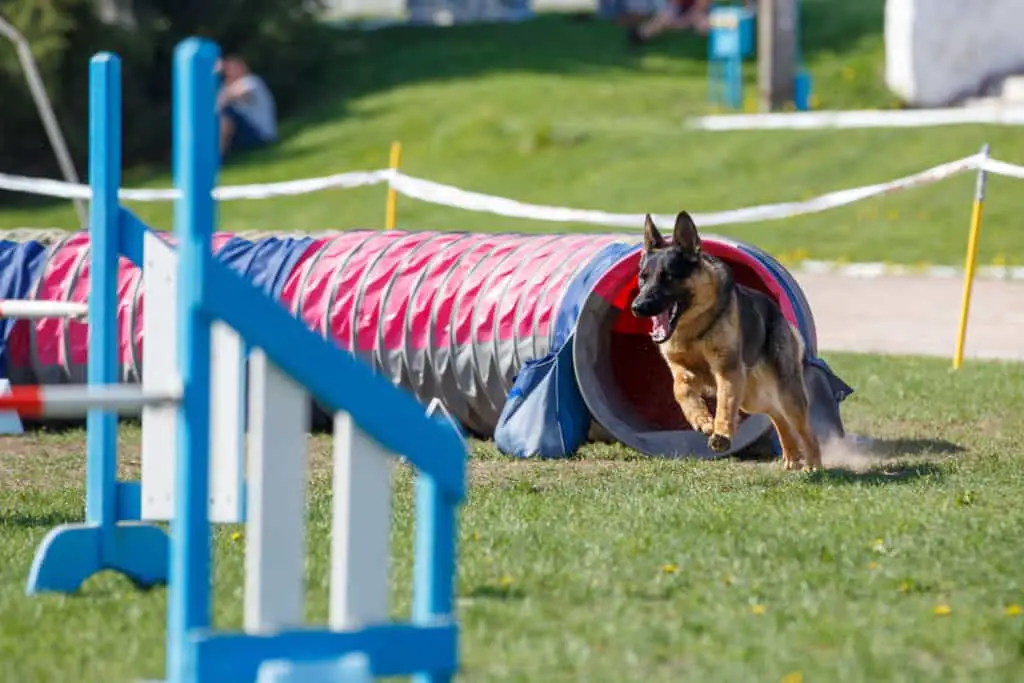German Shepherds are known for their bravery, loyalty, and of course, intelligence. Because of their keen sense and quick learning abilities, German Shepherds are often trained to be police, military, and guide dogs. They also make a wonderful family pet. It’s no secret that this breed has brains, but how did it get them?
In a study done in the book The Intelligence of Dogs, which ranked 110 dogs by their intelligence, the German Shepherd ranked number three. German Shepherds are extremely smart and have inherent guarding and protective instincts, which is a part of their high intelligence. They’ve consistently ranked as one of the most intelligent, obedient, and trainable dogs globally.
A lot of a German Shepherd’s intelligence comes from its breed history and modern breeding practices. They’re smarter than most dogs – and even some humans. German Shepherds’ intelligence makes it easy to train them and also shapes their temperament. Their brains and brawns make them ideal dogs for sporting events as well.
Why German Shepherds Are Smart
Much of the German Shepherd’s intelligence can be traced back to its roots and breeding. Originally bred to help farmers and guard livestock, their primary purpose in life is to protect and serve their owners. Their alert ears, bright eyes, and upright demeanor indicate that they are ready and willing to work.

They Were Bred To Protect
According to the German Shepherd Rescue, an ex-cavalry officer, Max von Stephanitz, cross-bred working sheepdogs in the 19th century to create a loyal and loving herding dog that could work for long hours. The German Shepherd’s instinct to protect sheep soon translated to protecting people.
The American Kennel Club indicates the German army used the breed as a war dog during World War I. Many American soldiers brought the dogs back with them to the United States. In World War II, both sides used German Shepherds as mine detectors and guard dogs. When the wars were over, people put the breed to work as seeing-eye dogs.
Today, those protective and diligent instincts make the German Shepherd the perfect dog to work in police and military forces. They’ve historically been trained as guide and therapy dogs, further proving the breed’s use as a utility dog. Those same traits also make them a devoted and loyal family dog. (Source)
Modern Breeding Efforts Keep Them Smart
Following World War II, continued breeding of the German Shepherd helped the breed further develop higher intelligence, versatility, and self-confidence. These traits are still visible in German Shepherds today. With safe breeding practices, the German Shepherd will continue to be one of the world’s smartest dogs.
According to Lara’s Canine Solutions, safe breeding practices ensure a German Shepherd will be happy and healthy. When you’re looking for your new furry best friend, these breeding practices should be apparent the moment you meet the breeder:
- Healthy parents
- Energetic puppies
- Welcome visitors
- Quality training
- Room to move around
Pros And Cons Of Having An Intelligent Dog
Having an intelligence dog – particularly a German Shepherd – comes with a few advantages and disadvantages. Whether it’s bred to be a working dog or adopted to a loving family, here are a few reasons a smart dog is beneficial to your life – and a few downfalls:
| Pros | Cons |
| Easy to train | Needs lots of attention |
| Entertaining playtime | Can pick up bad habits |
Pro: German Shepherds Are Easy To Train
German Shepherds can learn commands in a pinch (more on that below), making them easy to train and making it a fun activity to do with your dog. They’re also eager to please their masters, so they will be as obedient as possible and want to do everything to make you happy.
You’ll also feel extremely fulfilled with training a German Shepherd to its full ability. You and your dog will enjoy learning new things and spending time together, further strengthing the bond between you. Both you and the dog dedicate so much time to learning new things that it indeed will pay off.
Con: German Shepherds Need A Lot Of Attention
Smart dogs get bored quickly. Their mind needs to be stimulated on a near-constant basis so that they don’t become destructive. In addition to needing mind stimulation, German Shepherds have a lot of energy. They need to spend a lot of time expending it, whether on walks or running around with other dogs.
German Shepherds need at least two hours of exercise every day. Take it on walks but be sure to include some outdoor off-lease time, whether it be in a backyard or at a dog park. If you don’t have time to exercise your German Shepherd, have a friend or hire a dog walker to help out.
Instead of trying to get your dog’s activity done all at once, try spreading out walks and exercise throughout the day to keep your pup engaged and satisfied. If you love long walks and spending time outside, especially with your dog, don’t see it as a disadvantage. Instead, view it as an opportunity to have a walking buddy every day!
(Source: PDSA).
Pro: Playtime Is Elevated
The German Shepherd’s adaptability and high learning curve make it fun to teach and play games with it. Purchase a dog puzzle or teach it a new game other than fetch for some elevated playtime with your beloved German Shepherd. With that, German Shepherds are fun to watch. They are good problem-solvers, and you can observe them in real-time, figuring things out.
Con: Smart Dogs Can Easily Develop Bad Habits
If you don’t correct lousy behavior the moment you see it, a German Shepherd can develop bad habits in the blink of an eye. If you don’t structure the day or use training time to its full potential, the dog can develop wrong behaviors that will be hard to fix.
One bad habit a German Shepherd could develop is the ability to outsmart its human. The smartest dogs manipulate their masters to get what it wants, whether than be whining and barking for treats or intimidation to go on a walk. To stop these behaviors before they get worse, the owners need to be commanding and firm.

German Shepherds’ Intelligence vs. Other Dogs
Canine psychologist Stanley Coren conducted a study in 1994 to measure canine intelligence and the relationship between dogs and humans. Using a survey he sent out to obedience trial judges, Coren published a book called The Intelligence of Dogs. In it, he ranks 110 dogs by their intelligence. Where did the German Shepherd end up? Number three.
According to the survey, the only breeds that rank above the German Shepherd are the Border Collie and the Poodle. Coren measured dogs’ intelligence using two criteria:
- Ability to learn new commands in less than five repetitions
- Success rate of obeying first command (top 10 dogs was 95 percent)
In this study, the German Shepherd’s high obedience, coupled with its high intelligence, makes it one of the top smartest breeds.
(Source: Petrix)
German Shepherds’ Intelligence vs. Humans
According to Coren, dogs have a lot more in common with us than we think. The American Psychological Association (APA), reports the smartest dogs (including German Shepherds) have mental abilities similar to that of a 2-year-old child. Not only can some “super dogs” learn up to 250 words, but they can also count up to five.

Scientists conducted a study using arithmetic to help measure canine intelligence. In one test (1+1=2), dogs watch as researchers lower two treats behind a screen. When the researchers messed with the math and either swiped one treat or added an extra, the dogs stared in confusion before finally eating the treats.
Basic canine emotions are also on par – and in some cases, above – with that of toddlers. They display happiness, anger, and disgust; however, guilt, an emotion many researchers thought dogs possessed, is not in a dog’s emotional repertoire.
One final way dogs are as smart as small humans are in their problem-solving ability. They can locate treats, find faster routes to favorite places, and even figure out how to operate latches. They can do all this better than children as old as three!
(Source: Live Science)
How To Measure A German Shepherd’s Intelligence
Measuring a dog’s intelligence involves observing traits and characteristics it displays. According to Dog’s Health, a dog’s intelligence is nearly just as measurable as a human’s. If you want to determine your own dog’s intelligence, use Coren’s study as a guideline. He outlines three areas of canine intelligence (Source: APA):
Instinctive
In dogs, instinctive intelligence comes from what the dog is bred to do. For example, German Shepherds were bred to protect, so their instinctive intelligence is their need to protect. Just as retrievers retrieve and hounds track, German Shepherds guard.
While instinctive intelligence helps measure a dog’s intelligence, it can’t compare between two breeds or two dogs of the same breed. According to Dog’s Health, every dog has instinctive intelligence and therefore has different abilities. You can’t compare a ballerina to a football player, so why would you compare a tracking dog to a guarding dog?
Adaptive
Dogs use adaptive intelligence to solve problems by learning from its environment. Like instincts, adaptability varies among breeds and individual dogs, but adaptive intelligence can be compared. German Shepherds possess the same instincts, but if the dog doesn’t learn to adapt, it will often repeat mistakes.
Working And Obedience
Training also boosts a dog’s intelligence. German Shepherds go through training to become guard, police, and military dogs. In schooling, they learn new tools to help them in their role as a working dog. How well a dog obeys and remembers commands is a useful measure of intelligence – called “working and obedience” intelligence.
Obedience training is the same. According to the Smart Canine, German Shepherds easily learn verbal commands. If a dog doesn’t respond to instructions learned in obedience school, you can safely say that dog isn’t the brightest.
German Shepherds Are The Ultimate Working Dog
As mentioned above, German Shepherds were bred to work. Stephanitz successfully bred these dogs to be healthy and brave while at the same time maintaining a loving and loyal nature (Source: Vom Ragnar). These traits helped humans evolve and train German Shepherds to be highly effective police and guide dogs.
Every year, the American Kennel Club awards five hard-working dogs with the Awards for Canine Excellence. According to the AKC, the five winners receive an award for making significant contributions to an individual or entire community. It’s no surprise that German Shepherds have received the award 13 times, making it the all-time winning breed.

Police And Military
K-9 units are an essential asset to police departments, and German Shepherds are often the dog of choice for the job. You’ll often see them in airports, at subway stations, and even crowded events. For the military, K-9 units are essential to security forces in sniffing out illegal substances and keeping things in order.
German Shepherds first began their foray into police and military work during the World Wars. Working as mine detectors and guard dogs, people realized the dogs would be useful at the end of the war. Their fierce determination, loyalty, and alertness have made them one of the top canines for doing good work.
Nike, an 11-year-old K-9 Officer, won the 2010 Law Enforcement Award for Canine Excellence. Nike worked for 10 years, serving the citizens of New Castle County, Delaware. Nike helped apprehend 161 suspects during that time and seize $1.6 million in drugs. He also tracked down a lost Alzheimer’s patient and a 6-year-old autistic child. (Source)
Nike’s exemplary service is just one of many inspiring K-9 unit stories involving German Shepherds. German Shepherds strengthen police and military work worldwide, from solving crime to helping those in need.
Guide And Therapy
In the mid-20th century, humans began training German Shepherds as seeing-eye dogs. Training the breed in one specialized area of guiding evolved into using German Shepherds as guides and even therapeutic canines.
German Shepherds are often the guide dog of choice because they are quiet and calm and have a strong level of concentration and motivation to work for its owner. (Source)
German Shepherds are incredibly trainable, so they’re easily trained to be therapy dogs as well. According to Therapy Pet, the breed’s trainability and affectionate nature make them great emotional support animals. Many trainers teach German Shepherds to be patient and caring, both important traits for people with anxiety and depression.
Herding
The German Shepherd’s first-ever job as a breed was to herd and protect sheep. Some farmers today will use German Shepherds to watch over their livestock and keep them safe from predators. You can more in this article: Will A German Shepherd Protect Livestock?
According to the AKC, there are herding trials available that lead to championships.
Athletics
While it’s not a traditional canine job, athletics is another field where German Shepherds excel because of their intelligence and athleticism. These are a few sports in which German Shepherds are known to excel.
Obedience And Rally
Obedience and rally are two different events in which dog and owner work as a team to execute a series of exercises. Skills as simple as “sit” and “stay” to complex challenges like scent recognition put dogs to the test. German Shepherds are a perfect canine to participate in thanks to their high intelligence, quick learning skills, and work ethic.
Obedience is one of the organization’s oldest sporting events. Dogs competing in the event show off skills like off-leash walking, retrieving, jumping, and more. Top obedience dogs are well-trained and well-behaved in all situations and demonstrate enjoyment in performing the skills.
The rally event, on the other hand, requires more teamwork between dog and master. Rally is a newer AKC sporting event developed to create strong cooperation and bonds between dogs and owners.
In the event, a team runs a course together, passing through different obstacles and performing exercises. While it has similar aspects to other sporting events, it’s less rigorous. Unlimited communication is encouraged, and verbal and physical commands are allowed.
(Source: AKC)
Agility
The German Shepherd’s high energy, combined with its extraordinary athleticism, makes it a great dog for agility trials. Great agility dogs need concentration and speed, and they need to enjoy the event. According to the AKC, the breed ticks off all the boxes for an ideal agility dog:
- Effortless, smooth movement
- Strength
- Precision
- Desire to follow instruction
There’s nothing like experiencing the effortlessness of a German Shepherd’s movements during an agility trial.

Tracking
German Shepherds have great noses, which is why they make good police and military dogs. The breed is often involved with a lot of search-and-rescue work because of their powerful noses. Put your pup’s nose to the test with a tracking event, where dogs are tested on how well they can use their sense of smell to track certain scents.
Schutzhund
Schutzhund, a German term that means “protection dog,” was developed specifically because of German Shepherds. The German Shepherd Dog Club of America awards top dogs who demonstrate bravery, control, and handler loyalty. It’s the ultimate test for a police dog, gauging the ability to track, obey, and protect.
Training A German Shepherd
German Shepherds are notoriously easy to train, thanks to their intelligence. Take advantage of your keen canine to teach it effectively. Training should begin from the first day you bring home a German shepherd puppy. Establish a routine and stick with it. Routine practice and schedules will make your new pup more comfortable at home.
Intelligence Does Not Equate To Obedience
While German Shepherds are very smart, it’s important to remember – especially when training your dog – that intelligence does not equate to obedience. They are quick learners, but they don’t automatically understand a command after just one or two tries. It may take a few attempts, days, or weeks to teach your German Shepherd proper commands effectively.
Tips For Training
With proper training, German Shepherds can be a fantastic, loyal, and affectionate companion. Of course, their high intelligence requires more attention to making sure they’re content. Without foundational training, the German Shepherd can become very disobedient and destructive. Use these tips to train and treat your German Shepherd in the best possible way.
Exercise Your German Shepherd
German Shepherds are very active dogs that lead very active lifestyles. Therefore, they need a lot of exercise every day. Walk your dog every day and give it plenty of time to run around. Bored German Shepherds whose energy is suppressed can often become destructive.
Employ Mental Activities
German Shepherds need a lot of mental stimulation to enhance their ability to adapt, and problem solve. Without it, they can quickly become destructive. Stimulate your German Shepherd’s brain with games, regular training, and puzzles. According to the AKC, here are a few other ways to mentally stimulate your dog:
- Let your dog wander and sniff on walks
- Spend 5-15 minutes every day learning new tricks
- Play “hide-and-seek” with treats, toys, or yourself
Switch Up Rewards
If you give your German Shepherd the same treat or praise every time it responds positively to a command, it’s going to grow tired of performing the task. Keep your dog engaged and interested by changing up the type of treats or rewards you give.
Don’t Give In To Anger
When a dog does something wrong, it can be frustrating. But yelling at it won’t help and may excite your dog more than teach it to correct bad behavior. When your German Shepherd does something terrible, give it a strong “no” and ignore the dog afterward.
Stick To A Routine
Consistency is key to training. Sticking to a strict training regimen will ensure your German Shepherd learns to its maximum potential. Reward good behavior and ignore the bad. Stick to the same time for daily walks, meals, and training. Changing up the schedule will only confuse your dog and wreak havoc on its obedience.
Does Intelligence Affect Temperament?
Intelligence is absolutely a marker that affects a dog’s temperament. The German Shepherd’s ability to learn and obey make it a well-behaved dog, as long as it’s well-trained. The breed’s instinctive intelligence of loyalty and protection makes it the ideal dog to have around in a sticky situation.
According to the German Shepherd Dog Club of America, the breed’s personality is marked by the following traits:
- Direct and fearless, not hostile
- Self-confident
- Eager and alert
The German Shepherd’s outstanding loyalty makes it a dog you want on your side. In 2016, Haus, a 2-year-old German Shepherd, won the “Exemplary Companion” Award for Canine Excellence. Haus was bitten three times by a rattlesnake from which he was protecting his 7-year-old human companion. His inspiring protective instincts saved the girl.
Intelligence And Personality
A dog’s intelligence can very much affect its personality – at it’s measurable, too. The instinctive intelligence all dogs possess helps determine many behavioral factors. Dogs have three categories of behaviors or drives: prey, pack, and defense.
The prey drive involves behaviors motivated by motion, sound, and smell to hunt, kill, and eat. You may notice these behaviors when your dog rips toys apart, buries things in the ground, or chases other animals.
The pack drive involves a lot of social interaction, especially with other dogs. Licking, mounting, and cleaning ears are all demonstrators of the pack drive.
Defense drive is exactly what it sounds like: driven by survival. The defense drive includes aggression, avoidance or anxiety, and other survival instincts.
Using the three drives as a guideline, Volhard Dog Nutrition created a personality profile to help owners determine what drives their dog. It allows owners to understand why dogs do what they do and shape training to be more effective and enjoyable.
The profile asks you to rank 40 behaviors and tally them to see which drive is highest in your dog. German Shepherds are typically high in the defense drive but possesses a lot of the prey and pack drives as well – mainly because it’s so instinctually intelligent and driven.
In Conclusion
German Shepherds are one of the smartest dogs in the world. In a study conducted measuring canine intelligence, they ranked in the top three. They were initially bred to be loyal, hard-working dogs, giving them the instinct to protect and serve. The German Shepherd’s instincts, combined with its adaptability and proper training, make it smarter than young children.
The German Shepherd’s high intelligence not only makes it a good working dog but a great family dog. They are loyal, eager to please, and very affectionate. A well-trained German Shepherd will become a family member for life.
